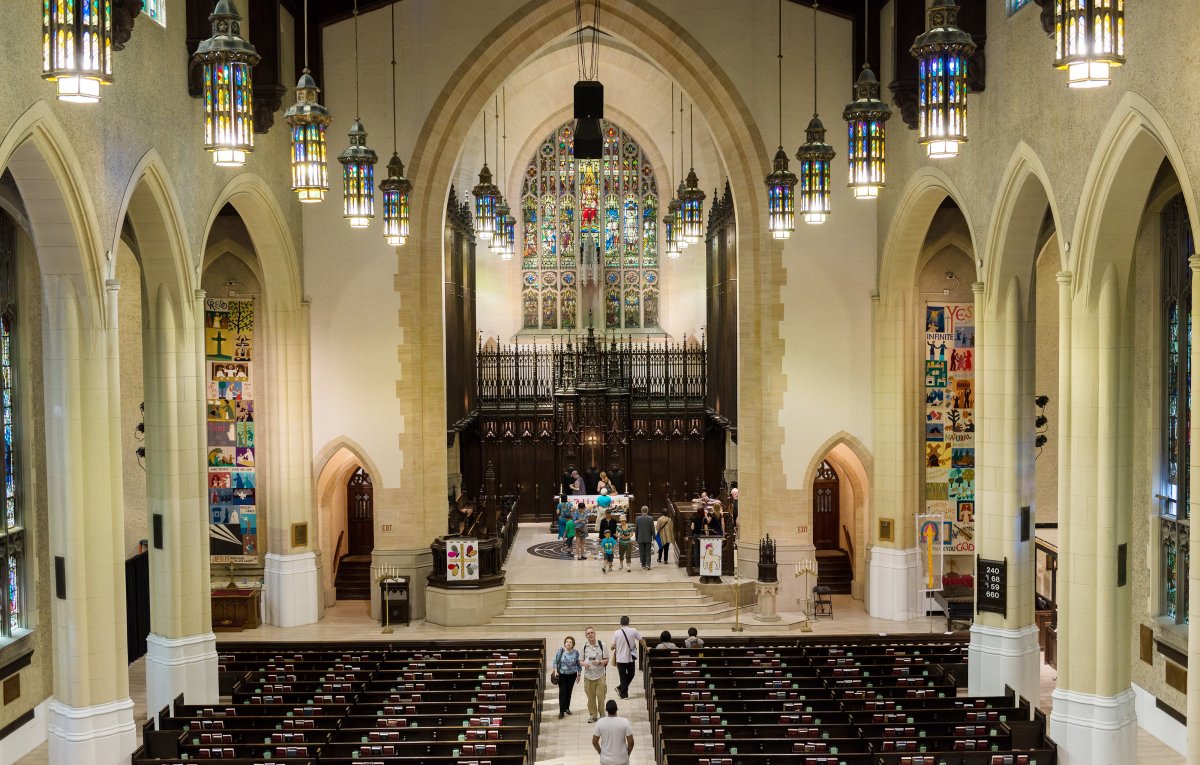It’s Advent Sunday and snow is falling thick and fast outside the front doors of the soaring, neo-Gothic bell tower of the Metropolitan United Church in downtown Toronto.

A tiny crowd huddles around a black Weber grill, emitting brief puffs of smoke as a crackling fire battles the elements.
“Come, gather around the holy barbecue,” Reverend Jason Meyers jokes.
It’s a modern scene amid very modern challenges facing religious institutions in Canada.
Religiosity in Canada is at an all-time low, with recently released data from Statistics Canada showing only 68 per cent of Canadians 15 or older now report having a religious affiliation. It’s the first time that number has dipped below 70 per cent since StatCan began tracking the data in 1985.
In response, Global News has spent the past two months speaking to members of religious communities across the country and looking at historical data to determine why this is happening. This is part one of that series.
- Part Two: Islam, Sikhism and why immigration drives religion in Canada: ‘It’s the curriculum of our life’
- Part Three: How COVID could change religion in Canada forever: ‘There is no going back
It’s important to note that this decline is not across the board; the number of Muslims, Sikhs, Buddhists and Hindus is increasing, and StatCan predicts the number of Canadians reporting a non-Christian religious affiliation could double by the year 2036.
Christianity, however, is in sharp decline. In 2011, 67.3 per cent (about 22.1 million people) of Canadians said they were affiliated with a Christian religion. In 2019, that number had dropped to 63.2 per cent. Catholicism, Canada’s largest denomination, now accounts for 32 per cent of Canadians over 15, down from 46.9 per cent in 1996.
The decline is even more precarious for Canada’s United and Anglican churches.

In 2021, the first Sunday in Advent — the season that commemorates Christmas, or the birth of Jesus Christ — has fallen on Toronto’s first snow day, Nov. 28.
Just six people have come to congregate around the Weber grill, for Metropolitan’s Taddle Creek Wild Church, a more modern and nature-based service than the traditional Sunday service.
Being experimental, it tends to attract smaller numbers than the standard Sunday service held an hour earlier. But that one too had barely 50 people in attendance; two to three people per pew scattered across a cavernous church.
But membership in the United Church of Canada (UCC) has been decreasing for decades, far before a snowstorm and a global pandemic.
'We lose a church per week'
Th UCC is the country’s second-largest Canadian Christian denomination. It accounted for 14.6 per cent of Canadian Christians in 1985. In 1996, that number declined to 9.7 per cent and to just 3.8 per cent in 2019. Islam, considered a minority religion, now sits at 3.7 per cent.
Nowadays, Meyers says, on average, the United Church loses one church per week across Canada and he expects that to accelerate.
He acknowledges that many people brought up religious lose interest, but says some come back of their own volition later in life. Meyers did so himself, turning to the church in his 30s after the breakdown of his marriage.
It’s for these reasons, he says, that despite the membership decline, he’s optimistic the United Church will not die out completely.
“There will be fewer churches and yet the ones that are able to build belonging across lines of difference — whether that is racial or economic, or like literal space, or somewhere here, somewhere online — they’re the ones that are going to stay and grow.”
It seems optimistic after a service of 50 people in a church built to house 2,000. But Meyers believes the pandemic has strengthened many Christians’ resolve.
“The deep desire for connection has not gone away. It has accelerated, I would say, and in a traditional church like this, or small group gatherings, we are hardwired for community. We’re hardwired for spirituality,” Meyers says.
“There’s more of a yearning, and people are looking for hope.”
The generational gap
But it’s hard to ignore the demographics of the congregation — the vast majority of whom have grey hair.
Statistics Canada data confirms the generational gap, finding that religious affiliation was at 85 per cent among older Canadians born between 1940 and 1959, compared with 32 per cent for those born between 1980 and 1999.
Gunn Wongsuwan, 28, knows, at his age, he’s in the minority as a regular Metropolitan churchgoer. The Toronto resident was brought up Roman Catholic but stopped attending church as a teenager. When he returned, in his late teens while living in Scotland, his friends thought he was “crazy.”

“I went back into church looking for structure, and then just realized there was a lot more to it than that. There’s a whole side of wanting to be still for a bit, to think on the eternal, to appreciate the art and the music and to contemplate the whole narrative,” Wongsuwan says. He joined Metropolitan upon moving back to Canada.
When asked his views on the role religion plays in 2021, given the changing times, Wongsuwan says perhaps now it is more important than ever.
“Aristotle said that man is a political animal. I think we’re also religious animals. A lot of us try to see meaning, to have a sense of spirituality. We want order, we want knowledge, and I think we have this sort of longing to be something that’s bigger than ourselves.”
Statistics Canada, however, also found that religion was becoming less important for Canadians on the whole. Those who reported religious or spiritual beliefs were “somewhat important” or “very important” to their lives was 54 per cent in 2019. In the mid-2000s, it was around 70 per cent.
Anglicanism: gone by 2040?
Anglicanism shares a similarly bleak outlook. StatCan data shows that in 1986, 10.4 per cent of all Canadians were Anglican. That dropped to 7.0 per cent in 1996 and to 3.8 per cent in 2019.
That year, Neil Elliot, the Anglican Church of Canada’s statistics and research officer, produced a report intended to show church elders what this would mean for its future.
After a membership decline between 1961 and 2001 of 50 per cent, and a similar decline between 1991 and 2015, Elliot projected the Anglican Church would run out of members completely by 2040.
Baptisms and confirmations had showed churches were “not drawing in substantial quantities of new members” and figures for funerals showed “we are not just losing members, we are losing the opportunities to draw in members, we are losing contacts with our communities.”
“These figures are therefore arguments for an increasing rate of decline in the next decade,” the report said, also stating that it was “unlikely that we are going to turn it around in the next 20 years.”
Two years later, Elliot’s outlook has changed somewhat. The pandemic had brought about an impetus for change, he says, but it remains to be seen if that will result in an influx of new members.

He says modern culture has been “pushing people away from the church” for decades.
“The idea of modernity, which is based on science, is somehow intrinsically against religion. There is a view that is out there, not one that I agree with, that science and religion can’t mix,” he says.
Elliot says the Anglican Church must adapt to survive. He says that his role is to try to drill this into the minds of clergy across Canada.
“I think of it very much like climate change, and people’s responses to climate change,” Elliot says.
“There’s three main responses to climate change: there’s denial … then there’s people who say we can stop it. And then there’s people who say, we can adapt…that’s what I’m trying to get us to do within the Anglican Church, it’s how do we adapt to it?”
Pivoting to more modern ways of delivering church services was crucial for future survival, he says, and to ensure active engagement. He’d done so for his own parish, St Andrew and St George in Kootenay. He now builds bulletin-style services, complete with YouTube videos.
Not only is there a decline in those who consider themselves religious in Canada, but participation in religious activities is also on the decline.
50% 'never' partake in religious activities
The number of people who answered “not at all” to the question of frequency of attending group religious activities in the StatCan survey, was an overwhelming 53 per cent. Only 23 per cent of Canadians said they attend group activities at least once a month. Between 2000 and 2009, that figure was around 30 per cent.
However, some denominations were well above this average — mostly more evangelical groups. Jehovah’s Witnesses (86 per cent) reported the highest participation rates.
Canadian Jehovah’s Witnesses spokesman James Dumeignil says the number of Jehovah’s Witnesses is increasing year-over-year — with 3,000 more members in 2021 than in 2020. StatCan data, however, shows a decline in Canadian membership to 137,775 from 168,370 in 1991.
Dumeignil says participation rates are so high because their religion — which differentiates itself in its belief in only one God, Jehovah, rather than the Holy Trinity (the Father, the Son and the Holy Spirit) of Christianity — underpins their entire lives.
That, and for the religion’s well-known, often relentless, advocacy of itself, through door-knocking and outreach programmes. But Dumeignil says that only plays a small role in persuading people to attend meetings, and people are more likely to be drawn in by its optimistic outlook and a mantra that “it’s inevitable that things will improve.”

Some Christian congregations say they are also bucking these trends. A spokesperson for the Archdiocese of Toronto, home to Catholics in the GTA, says while city locations were suffering, churches in smaller towns and communities continued to pull in big numbers.
Father Liborio Amaral, pastor of St. Mary’s in Brampton, a Catholic church, says it is rare for his 800-capacity church to be less than 75 per cent full on a Sunday. Amaral thinks, anecdotally, that attendance is increasing — especially in younger people.
“Normally now, when you see a line-up of people going to confession, they’re younger people — in their teens or early 20s. Within the last 10 years or so, something is happening and the youth are realizing that they need God. I think it’s about the shallowness and emptiness in sometimes what people think will bring them joy — the job, the career, the house, the car. So they’re looking at the spiritual part of their life,” he says.
“When you’re younger, you are carrying your parents’ faith. But they get to a certain age and they say, ‘It’s no longer my parents’ faith. It has to be mine.’”
'You don't have to be religious to be Jewish'
The United and Anglican churches and Judaism report the lowest numbers of those who engage in religious activity at least once per month — at 19 per cent, 19 per cent and 24 per cent, respectively.
Judaism has unique challenges. For example, Shabbat (Judaism’s day of rest, observed from sunset on Friday to nightfall Saturday) is when many school sports are played, prompting a choice between religion and extracurricular activities from a young age.
“The society we live in discourages adherence to religious precepts,” says Stan Grossman, chair of the ritual committee for the Beth Sholom synagogue in Toronto.
The proportion of Jews in Canada has fallen steadily over the years. In 1985, 1.6 per cent of Canadians were Jewish, according to StatsCan. That number fell to 1.1 per cent in 1996 and in 2019 is about 0.8 per cent.
For the non-Orthodox community, participation in weekly and daily services pre-COVID had been “somewhat disappearing,” Grossman says.
“We’ve been impacted just across the board as this whole generation has grown. And religion has not become a way of life for this generation.”
Five years ago, a Shabbat service would have pulled in 150 to 200 people, Grossman says. At a service in early December, during Chanukah, about 80 well-dressed people are scattered around the expansive Beth Sholom synagogue. But about half of them are not members — they’re friends and family of a young girl celebrating her Bat Mitzvah.
Cantor Eric Moses addresses the congregation as he would a full congregation — tearfully recounting his own journey as the only Jew at his school in Sudbury, desperately trying to fit in.
“I was the boy who knew all the Christmas songs by heart, who left milk and cookies out for Santa, but Santa never came.”

Speaking after the service, Grossman says Moses’ story is typical of many. But these days, young Jewish children were given a choice about going to the synagogue, when that choice didn’t exist for previous generations.
“As a next generation, I’m guilty, because I didn’t do to my children the same thing that my parents did to me,” Grossman says.
Beth Sholom had been working on youth outreach programmes to get their attendance up. But Grossman accepts that declining membership and attendance shouldn’t directly translate to a decline in Jews in Canada.
“You don’t have to be religious to be Jewish,” he says.
Why life no longer revolves around church
Sarah Wilkins-Laflamme, who teaches sociology at the University of Waterloo, has been tracking changes to Canada’s religious landscape for years. However, she subverts the question of decline: “I say, ‘Why were so many people involved with Christianity?’ rather than saying, ‘Why are so few involved now?’”
Wilkins-Laflamme says Western Christianity in Canada was not receiving an influx of new immigrants to boost their rolls, unlike Islam, Hinduism, Buddhism and Sikhism.
A societal shift was also propelling Canada toward secularization, in a world where daily life no longer “revolves around the church.”
“There’s a series of factors at play. We’re just not in the same kind of society we were at the end of the 19th century, or start of the 20th century, when a Christian church went with a set of other social factors. So you think back to the 19th century, the hub of social life was the village and in the centre of the village was a church or multiple churches,” she says.
“We’ve shifted to a different society where there are alternatives. There’s alternatives in terms of who’s providing the social services, schools, health, education and entertainment.”
The past few decades had been about “consolidating” an “unsustainable number of churches” across the country, she says.
“There were a lot of churches in downtown Toronto. A lot of those have sold and become condos or high-end restaurants. It tells you something about our society, what these places are becoming. We’re desperate for housing and we’re not desperate for places of worship.”
The lack of affiliation had been most pronounced in younger age groups, due to how people are being brought up, Wilkins-Laflamme says.
However, the religions that have remained are “so much more diverse,” she says. Questions around exclusivity to one religion will now need to be addressed, where people can report being part of more than one, “like a multi-choice answer,” she says.
“We’re currently in a society that highly values things like personal choice … where you’re finding your own way rather than relying on a religious leader or an institution,” she says.
“So will the United/Anglican Church completely die out? Probably not. There’ll be some form leftover but it’ll be quite small. They’re going to be a small minority.”
- Gas prices in Ontario, Quebec to jump to highest level in 2 years: analyst
- ‘Bacterial vampirism’: Deadly pathogens attracted to human blood, study finds
- Shoppers faces proposed class action over claims company is ‘abusive’ to pharmacists
- What’s going on with the Cybertruck? Tesla seems to have halted deliveries







Comments